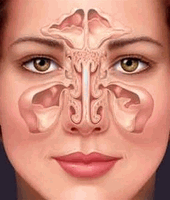
WHAT IS SINUSITIS?
Uh-oh. You're sneezing, coughing, and you have a bright red nose. You figure it's just another cold, but this one sticks around way too long. Is it really a cold? Maybe not. It could be a problem with your sinuses.
Sinusitis simply means that your sinuses are infected or inflamed. Most health care experts divide sinusitis into three types:
1. Acute, which last for 3 weeks or less
2. Chronic, which normally lasts for 3 to 8 weeks but can continue for months or even years
3. Recurrent, which comprise several acute attacks within a one-year period
It is estimated that approximately 37 million Americans are affected by sinusitis each year. Health care providers report roughly 32 million cases of chronic sinusitis to the Center for Disease Control and Prevention annually. Moreover, Americans spend literally millions of dollars each year for many types of medications that promise relief from their sinus infection symptoms.
SOME CAUSES OF ACUTE SINUSITIS
Most cases of acute sinusitis start with a common cold, which is caused by a virus. These viral colds do not cause symptoms of sinusitis, but they do inflame the sinuses. Both the cold and the sinus inflammation usually go away without treatment in 2 weeks. The inflammation, however, might explain why having a cold increases your likelihood of developing acute sinusitis. For example, your nose may react to an invasion by viruses that cause infections such as the common cold or flu by producing mucus and sending white blood cells to the lining of the nose, which congest and swell the nasal passages.
When this swelling involves the adjacent mucous membranes of your sinuses, air and mucus are trapped behind the narrowed openings of the sinuses. When your sinus openings become too narrow, mucus cannot drain properly. This increase in mucus sets up prime conditions for bacteria or fungus to multiply.
Most healthy people harbor bacteria, such as Streptococcus pneumoniae and Haemophilus influenzae , in their upper respiratory tracts with no problems until the body's defenses are weakened or drainage from the sinuses is blocked by a cold or other viral infection. Thus, bacteria that may have been living harmlessly in your nose or throat can multiply and invade your sinuses, causing an acute sinus infection.
Sometimes, fungal infections can cause acute sinusitis. Although fungi are abundant in the environment, they usually are harmless to healthy people, indicating that the human body has a natural resistance to them. Fungi, such as Aspergillus , can cause serious illness in people whose immune systems are not functioning properly. Some people with fungal sinusitis have an allergic-type reaction to the fungi.
Chronic inflammation of the nasal passages also can lead to sinusitis. If you have allergic rhinitis or hay fever, you can develop episodes of acute sinusitis. Vasomotor rhinitis, caused by humidity, cold air, alcohol, perfumes, and other environmental conditions, also may be complicated by sinus infections.
Acute sinusitis is much more common in some people than in the general population. For example, sinusitis occurs more often in people who have reduced immune function (such as those with primary immune deficiency diseases or HIV infection) and with abnormality of mucus secretion or mucus movement (such as those with cystic fibrosis).
CAUSES OF CHRONIC SINUSITIS
It can be difficult to determine the cause of chronic sinusitis. Some investigators think it is an infectious disease but others are not certain. It is an inflammatory disease that often occurs in patients with asthma. If you have asthma, an allergic disease, you may have chronic sinusitis with exacerbations. If you are allergic to airborne allergens, such as dust, mold, and pollen, which trigger allergic rhinitis, you may develop chronic sinusitis. An immune response to antigens in fungi may be responsible for at least some cases of chronic sinusitis. In addition, people who are allergic to fungi can develop a condition called allergic fungal sinusitis. If you are subject to getting chronic sinusitis, damp weather, especially in northern temperate climates, or pollutants in the air and in buildings also can affect you.
If you have an immune deficiency disease or an abnormality in the way mucus moves through and from your respiratory system (e.g., primary immune deficiency, HIV infection, and cystic fibrosis) you might develop chronic sinusitis with frequent flare-ups of acute sinusitis due to infections. In otherwise normal individuals, sinusitis may or may not be infectious. In addition, if you have severe asthma, nasal polyps (small growths in the nose), or a severe asthma attacks caused by aspirin and aspirin-like medicines such as ibuprofen, you might have chronic sinusitis
DIAGNOSIS
Because your nose can get stuffy when you have a condition like the common cold, you may confuse simple nasal congestion with sinusitis. A cold, however, usually lasts about 7 to 14 days and disappears without treatment. Acute sinusitis often lasts longer and typically causes more symptoms than just a cold.
Your doctor can diagnose sinusitis by listening to your symptoms, doing a physical examination, taking X-rays, and if necessary, an MRI or CT scan (magnetic resonance imaging and computed tomography).
"It works it really works. I have had sinus
problems for 50yrs but this product is so easy and really works thank you." - M. A. - California
|
|










